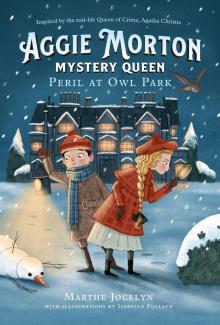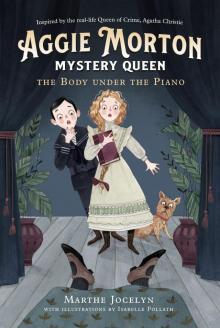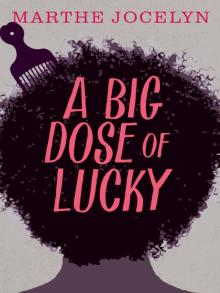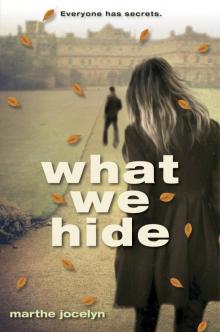- Home
- Marthe Jocelyn
The Body under the Piano Page 2
The Body under the Piano Read online
Page 2
Shrill laughter interrupted my pleasant daydream. Florence and Lavinia were falling over themselves to assist a young man edging his way through the door. He hauled in one large floral bouquet, and then another, and set down the ornate vases on either side of the piano. He tugged off his cap to reveal a mop of chestnut hair and dark eyes. Girls like Florence and Lavinia would not normally deign to look at a delivery boy, but this was Leonard—especially handsome, and almost eighteen. As he was employed by my mother, the prestige of knowing him was rather more mine than theirs, was it not? He slept in the groundskeeper’s shed at Groveland in exchange for helping in the garden and the hothouse. I saw him every day, so let Florence and Lavinia try to shift the heavy pots into the most suitable position. What did I care?
Miss Marianne soon stepped in to scold them away. “Please allow the young man to perform his task. There are fifty-five programs, my dears. I hope I can trust you to fold them precisely?”
“Hello, Leonard,” I said.
“Miss Agatha!”
“Your arrangements are lovely.”
“Yes, miss. From your own greenhouse. Pretty as anything.”
The Groveland gardens, neglected since Papa’s death, had quite revived under Leonard’s care this past summer. He’d assembled the bouquets for my sister Marjorie’s wedding last month, only weeks after he’d arrived in Torquay and moved into the shed behind the kitchen vegetable plot.
“All for a good cause, eh, miss? You’ve got a soft heart for creatures in need, haven’t you? Animals and humans.”
“We all do!” Florence had crept closer again. “That’s why we’re here, isn’t it, Lavinia? Very soft hearts, we’ve got.”
Lavinia clutched a sheaf of programs and nodded in ardent agreement. “No one softer,” she said.
Soft in the head, I thought. How easily they peeved me! Leonard smiled as if he’d read my thoughts.
“We’re dancing tonight,” said Florence. She pushed a program into his hand and pointed:
A GRACEFUL MOMENT
Music by FRÉDÉRIC CHOPIN
Interpretation by MISS MARIANNE EVERSHAM
Movement by FLORENCE FUSSWELl
and LAVINIA PAINE
Florence whispered, “Maybe he can’t read.”
Lavinia ignored her. “My name is only second because the listing is alphabetical,” she said.
But Leonard’s finger had moved down the page.
“And you, Miss Agatha? You’re saying a poem?”
A shiver tingled up my neck. I’d got this far in the day by avoiding thoughts of what was coming at the end of it. A recitation that waited like a jowled monster to gobble me up. I managed a bit of a nod and stared hard at Leonard’s scuffed boots. One of his laces had been broken and re-knotted in at least three places.
“She’s the one who wrote the verse,” said Florence. “It’s not by a real poet, not Tennyson or anyone.”
“That makes it better then, doesn’t it?” said Leonard. “Writ special for these new strangers come to town.”
My heart about burst with gratitude. I glanced up to bestow an appreciative smile, but he was turning to nod at Miss Marianne.
“You’ll be back in the morning, Mr. Cable?” said Miss Marianne. “To collect these up again?”
Leonard nodded. “If you’re sure, ma’am, that you don’t want to keep them? Till the flowers aren’t so fresh?”
Miss Marianne smiled at him. “You’re a kind lad to offer, but no. Return them to Mrs. Morton. We need to dance in here!”
Leonard slid his cap back on and touched its brim in a salute. The door opened as he reached it, and all at once the entrance was congested with quite a crowd.
Rose Eversham was first, with her mother a step behind. The Evershams lived next door to Mummy and me, in a villa named EverMore. Wasn’t that a divine name for a house? Miss Marianne lived there too, being Rose’s aunt, and with no family of her own.
Following the ladies was Florence’s brother, Mr. Roddy Fusswell, from the Royal Victoria Hotel, holding aloft an enormous platter of macaroons and tiny fruit tarts. On his head was a gray top hat. His hands were sheathed in yellow leather gloves. He wore a frock coat and a billowy cravat, as if our recital were occurring at the Royal Albert Hall in London and not above a shop on Union Street. His two assistants each carried a plate of dainty sandwiches.
A chittering hum started up, all of us thrumming with excitement to be near Rose Eversham, starring subject of gossip flying about town this past week. Stories claimed that she’d been seen in the company of more than one young man at the roller rink on the pier, laughing and twirling without a care who noticed. Further whispers said that her mother had scolded her sharply on the high street, only to have Rose turn and walk away, as rude as can be!
(One of the young men was Roddy Fusswell, another was Charlie Trotter, the butcher’s son. Rose had also been seen kissing a sailor, but it was Lavinia who made that claim, so we could safely dismiss it.)
And here she was, sailing through the door like a queen on the prow of a ship. Leonard ducked his head as if caught in a glaring beam of sunlight. He slid to one side, allowing the parade to enter.
Rose waved at Miss Marianne. “Darling Auntie M.! You see? Not a minute past five o’clock. I vowed not to be late and I’m as good as my word. And! With Mother.”
Had her eyes performed the slightest of rolls? And was that an answering flicker in Miss Marianne’s? It seemed there was a conspiracy of niece and aunt. Everyone—truly, everyone—knew Rose’s mother to be a trial. Our maid, Sally, called Mrs. Eversham a prickly old cow. Though we were neighbors, I rarely had the opportunity to examine her so closely as this.
Mrs. Irma Eversham had the face of a grumpy dog. She paused on the threshold, looking about as if she’d caught a whiff of something rotten. Roddy Fusswell, holding his tray of treats, was only half a step behind. He now met her back with a thunk. For a terrible moment the pastries threatened to shower down upon her head (as he was tall and she was squat), but Mr. Fusswell managed an agile twist and kept the tray aloft. A solitary jam tart slid over the rim and landed on the crown of Irma Eversham’s hat. Rose and Miss Marianne both lunged forward to offer aid. Roddy Fusswell plucked at the tart from above, knocking Leonard’s shoulder with his elbow. Mrs. Eversham became a spitting cat, turning her head so abruptly that the tart flew off and was nimbly caught by Miss Marianne.
“Keep away from me!” Mrs. Eversham shook off all assistance. Miss Marianne stepped back, pressing Leonard into the door frame. Roddy Fusswell hovered too closely but could not move in the knot of people. Mrs. Eversham’s indignation made the room vibrate.
“And furthermore,” she said, “keep away from my daughter.”
“Mother!” Rose switched her valise from one hand to the other, making a great show of its contents being heavy. “Let us think about the needy,” she said, quickly and loudly. “I’ve gone through my wardrobe and had a good clean out. I shall have to order new things very soon, unless you want to see my unmentionables!”
“Rose!” scolded Mrs. Eversham. “Such brazen talk!”
“Will you come and sit down, Mrs. Eversham?” Charlotte’s calm voice and steady hand reached through the mayhem. “We have reserved you a place here in the front row.”
“Yes, Mother, please sit,” said Rose. “I will make you a cup of tea. And a biscuit? You love a sugary biscuit.”
“I will not sit,” said Mrs. Eversham. “And I will not stay. I did not want to be here and the present company confirms that. Do not fuss, Rose! I can certainly get my own self home.”
Rose made no further effort to convince a change of mind. Lavinia stifled a giggle. Leonard had been creeping toward the exit but froze when Mrs. Eversham turned to leave. I slid behind Charlotte as Roddy Fusswell put down his platter and offered to escort Mrs. Eversham to the street. She refused with a
brusque flap of her hand, as if he were a hornet. He put a hand under her elbow and again she swatted him. This time he retreated, treading on poor Leonard’s toe.
Mrs. Eversham continued calling, even as she descended the stairs. “I’ll see to it that any young man who approaches my daughter will be imprisoned on a charge of attempting to assault her. Does everyone hear me?”
I was not the only person waiting to exhale when we heard the door below slam shut. My palms itched to applaud. It had been ten minutes of jolly good theater, better than a Christmas pantomime!
A phlegmy noise in Roddy Fusswell’s throat set the room back in motion. Leonard finally made his exit, though I imagined that he opened the street door with great caution, in case Mrs. Eversham had not yet trundled off. Rose lifted the lid of her valise and dumped the contents into one of the crates.
“How do you bear it, Rose?” asked Roddy. “She is insufferable. She should not be tolerated a single day longer!”
“Life would certainly be smoother,” said Miss Marianne, “if she were not in Torquay.”
“Sadly true,” said Rose. “At least once a day, I find myself wishing that she were dead.”
CHAPTER 3
A DELIGHTFUL EVENING
OUR AUDIENCE WOULD be here any minute. We madly folded the remaining stack of programs, except for Florence, who preferred to shadow her brother. Roddy Fusswell was precise in directing his helpers as to where the trays should go, the angle at which to place the dainty serviettes, and where the milk jug and sugar bowl must stand in proximity to the tea urn.
“Go away!” he whispered to Florence, which Lavinia seemed to think was hilarious. Florence swiped a lemon tart and crammed it into her mouth before Roddy could stop her. He clamped his fingers around her wrist as she chewed, squeezing so tightly that she began to splutter crumbs.
“Oww!” She tugged, but her brother held on. “Let me go!” she said. Then, “Oh dear.” More loudly. “What is that on your face?”
Roddy Fusswell glared at Florence as if she were a slug on a plate of biscuits. He released his grip and one of his hands slid upward to check.
“Oh!” she said. “I thought it was a fuzzy yellow millipede but now I see! It’s your attempt to grow a mustache!”
Lavinia snorted. Roddy looked as if he might tip the tea urn over his sister’s head. But Miss Marianne put a hand on Florence’s shoulder.
“This evening is about befriending,” she said. “Have we not heard enough harsh words for one night? I am at the end of my tether with unpleasant relations.”
Coming in now was the Reverend Mr. Teasdale, vicar of All Saints Church, accompanied by his dour wife. Mr. Teasdale would shepherd donations from the Mermaid Room to the needy families. Indeed, he ceremoniously placed his own contribution—a woolly red cardigan—on top of the offerings from Rose’s drawers. He and Mrs. Teasdale took up positions nearby to direct further gifts. Lavinia and Florence were to give each family a program. Mummy arrived, looking very smart. Despite being still in mourning for Papa, she’d put a blue feather in her hat, exactly the color of her eyes. She brought me a set of new pencils as a good luck present, wrapped with a velvet ribbon.
The minutes until my recitation were whirling past at a dreadful speed. One moment we all waited in place, worried that no audience would appear. The next moment, the room and donation boxes were half-filled and the platters of tea cakes half-empty. Only a few moments more and every chair was occupied. The boxes overflowed with a most peculiar collection of items for the about-to-be-befriended immigrants and refugees. Would someone fleeing a turbulent homeland need a veiled hat covered with coral-colored chrysanthemums? Or a pair of tasseled patent leather pumps? Fortunately, there were also heaps of warm jumpers and knitted stockings, sturdy flannel trousers and tweed skirts. Dozens of the needy poor would have a warmer winter thanks to our concert.
Miss Marianne gave us the signal to duck behind the curtain that hid the narrow pantry from the main studio. I squinted through the opening to keep watch. Miss Marianne turned down the gas lamps on the audience side of the room, leaving the empty stage bathed in a bright, expectant glow.
A slim young man in a brown suit opened the door from the hallway with too much force, just as the chatter subsided. Everyone jumped a bit, turning to stare at the stranger. He raised his hands in apology, snatched off his hat, and took a place against the back wall.
The girls beside me shivered in their dance tunics, breathing sugary breaths. Miss Marianne had forbidden fancy costumes, despite Florence Fusswell’s protests, as this was a charitable performance, not a time to be frivolous or vain. The rehearsal tunics were the color of porridge. Mummy had agreed, as ten months had passed since Papa’s death, that I might put aside my mourning clothes and wear last year’s Sunday dress, grass-green silk with a pleated skirt. It was a bit worn at the elbows, but I’d be facing forward, wouldn’t I? Charlotte had assured me that no one would notice. I held my poetry notebook and wished the evening done with, imagined my dress on its hanger and myself beneath the covers of my bed.
“Good evening, my friends.” Miss Marianne stood with Rose next to her. “Thank you for joining us for this special gathering.” She gestured toward the impressive assortment of donations. “Together we have made life better for our new neighbors.”
Gentle applause rippled through the room.
“I believe that friendly foreigners have much to offer our community,” said Miss Marianne. “The determination and endurance of immigrants seeking a new home is inspiring to those of us who are fighting for a woman’s right to have a say in the quality of her home as well.”
“Not this again,” said Florence.
Miss Marianne’s favorite topic, Votes for Women.
“The day will come, before these girls are grown, when they will have a voice their mothers and aunts do not. That voice is called the vote!”
“My father will make noise,” said Lavinia. “He says the ideal woman is a mute.”
On cue, a loud harrumphing in the audience came from Mr. Paine.
“Auntie?” said Rose.
“Get on with it,” said Mr. Paine, rather more loudly than was polite. “Let’s have the dancing girls.” Lavinia’s eyes were squeezed shut.
Miss Marianne put an arm around Rose’s shoulder and summoned a cheerful smile. “I shall leave the preaching to Mr. Teasdale henceforth,” she said. “May I introduce my favorite niece—”
“Your only niece!” said Rose.
“And my star pupil, Miss Rose Eversham.”
People clapped, and Mr. Roddy Fusswell whooped in the vulgar manner of a football fan.
“Rose,” said Miss Marianne, “will introduce the girls who follow in her footsteps.”
“Thank you all for being here,” said Rose. “Let us show appreciation for the gracious contribution of flowers from Mrs. Morton’s greenhouse, and the delicious treats provided by the Royal Victoria Hotel.”
Another smattering of applause.
“Most of you knew and remember my father,” Rose said, “Captain Giles Eversham, may he rest in peace. He taught me that an important step in becoming an adult is learning to give instead of to receive.”
A sympathetic murmur ran through the audience. Mr. Teasdale nodded so vigorously that I expected to see his head topple off. Now that would be a colorful detail in a story, would it not?
Wrenched from its perch, the dislodged cranium rolled to a stop next to Mrs. Teasdale’s tightly laced boots. A geyser of blood erupted from the reverend’s stiff white collar and splurted heavenward.
Rose waved a hand at the brimming donation boxes. “My father would be proud of us tonight.”
The listeners began again to clap, but Rose held up a hand. “Please save your applause for the artistes. As you see in your program, my aunt has arranged a dance to complement the music of Chopin.”
I pull
ed aside the curtain to let the dancers pass, and held my breath as Miss Marianne sat upon the piano stool and began to play. The girls swayed on the stage like knobby saplings in a gusty breeze. The tip of Florence’s tongue stuck out at the corner of her mouth. Lavinia perspired like a glass of iced lemonade on a summer day. I had an inkling that what was taught in the Mermaid Dance Room was more rewarding for the dancers than for the audience. But applause came, whether deserved or not. Florence and Lavinia hurtled into the pantry. The dreaded moment had arrived. My stomach seemed to be full of walnut shells.
“Your turn, go on!” Florence gave me a hefty shove.
I was next to the piano, my mouth as dry as talcum powder.
“And now…” Rose smiled in a futile effort to bolster my courage. “We will hear a poem written especially for this occasion. Please welcome Miss Agatha Morton.”
The audience waited for me to begin, rows of kindly faces, all eyes on me. The ability to move my lips departed altogether. My fingers clenched my notebook so tightly that its cover was slightly damp. Mummy beamed in the second row, with Charlotte next to her. Miss Marianne nodded from the side of the room, and the slim bespectacled stranger at the back was writing in a notebook of his own.
But chuh, chuh, chuh…a familiar pulsing in my ears confirmed that I would not be reading aloud this evening. I was icy cold and burning hot in alternating shivers. Mummy’s smile faltered and Charlotte’s was gone altogether. Silently, I implored Rose to save me. And so she did. Rose, whom I now would love forever, stepped close and slid an arm about my shoulder. She gently extracted the notebook from my hand.
“Change of plan,” she said. “I shall have the honor of delivering the world’s first reading of a poem entitled…”
I mutely shook my head. I had failed to name the poem!
“…of a new work by Agatha Morton!”
I tiptoed over to stand near Miss Marianne, my eyes prickling with hot tears. She put a soothing hand on my shoulder as we listened.

 Peril at Owl Park
Peril at Owl Park The Body under the Piano
The Body under the Piano Mable Riley
Mable Riley Earthly Astonishments
Earthly Astonishments How It Happened in Peach Hill
How It Happened in Peach Hill The Invisible Day
The Invisible Day The Invisible Harry
The Invisible Harry A Big Dose of Lucky
A Big Dose of Lucky What We Hide
What We Hide Would You
Would You Secrets
Secrets First Times
First Times The Invisible Enemy
The Invisible Enemy Folly
Folly